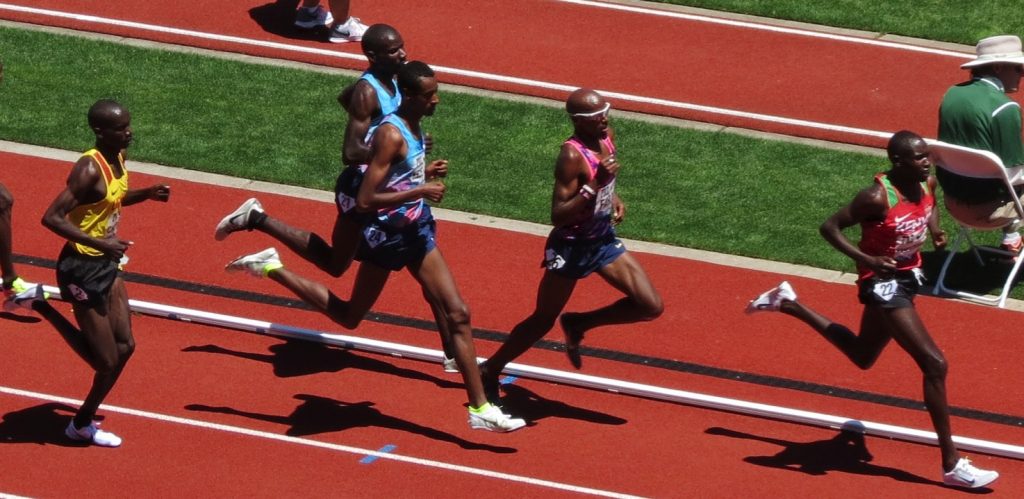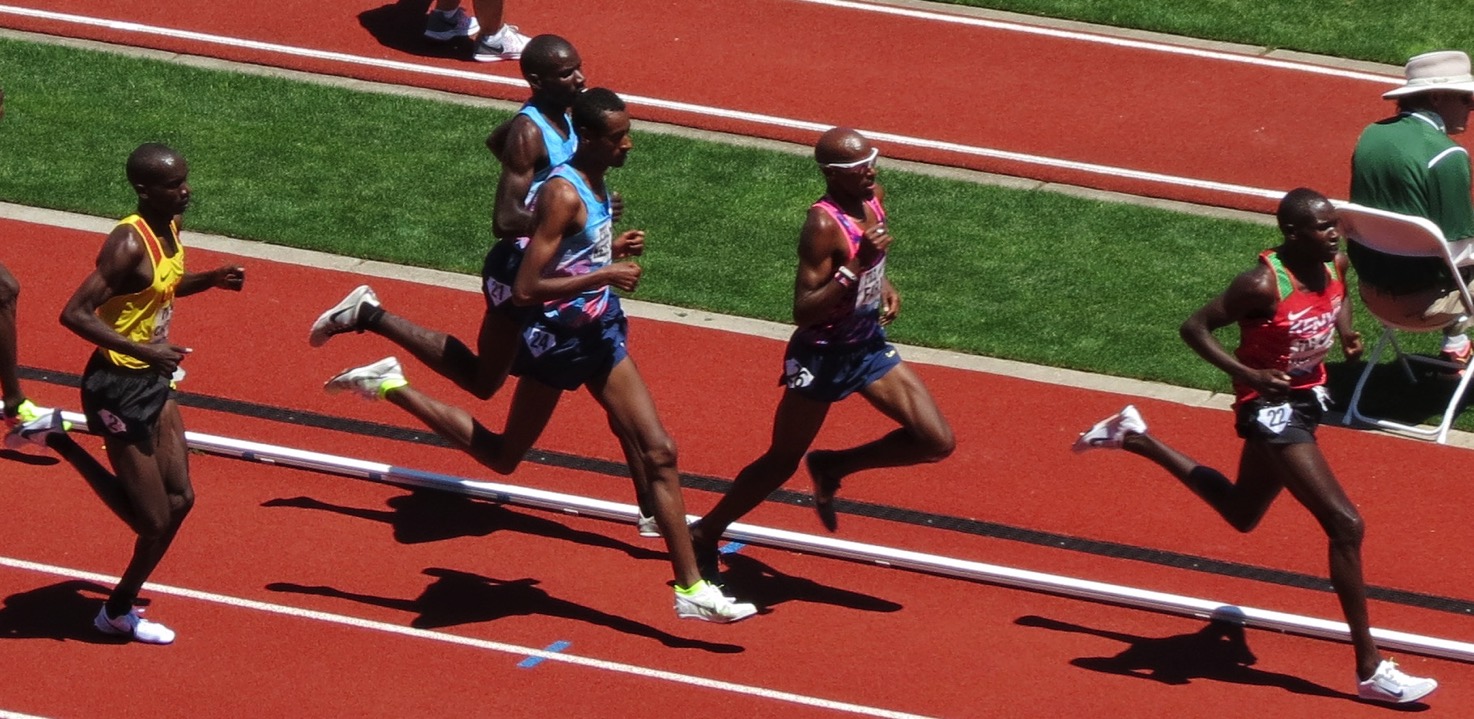By David Monti, @d9monti
(c) 2017 Race Results Weekly, all rights reserved
EUGENE, ORE. (27-May) — In 2011, Britain’s Mo Farah made his Prefontaine Classic debut, winning the 10,000m in a European record 26:46.57. Since that night, he has competed in the meet five more times, winning every year but one, 2013, when he finished second to Kenya’s Edwin Soi in the 5000m (he didn’t compete in 2014).
Farah, 34, who already has four Olympic gold medals and five world titles, lined up for today’s 5000m at the 42nd Prefontaine Classic here with one goal, to go out on top. He said that this was his final track race at Hayward Field and, indeed, on U.S. soil. He was ready for battle.

PHOTO: Mo Farah (wearing the sunglasses) on his way to winning the 2017 Prefontaine Classic 5000m over Kenya’s Geoffrey Kamworor (right), Ethiopia’s Yomif Kejelcha (hip number 24), Bahrain’s Albert Rop (hip number 21) and Uganda’s Joshua Cheptegei (far left in yellow top). Photo by David Monti for Race Results Weekly
“Obviously, you know, I have a target on my back as I always do, because I’ve been on the top of my game for the last five years,” Farah told reporters. “Everybody wants to beat me.”
But not today. In a huge field of 29 men, Farah toyed with his competitors, including two-time world cross country and half-marathon champion Geoffrey Kamworor of Kenya. He gingerly moved up through the field, varied the pace when it suited him, put himself into second position with four laps to go, then unleashed a 55-second final lap to beat them all in 13:00.70, the fastest time in the world this year.
“It’s quite emotional,” Farah said of closing his Hayward Field career. “Two thousand eleven, that was my breakthrough year, if any of you guys remember. I wasn’t even expected to win the race and I won the race, got the British record, British and European record. Amazing. It gave me a massive boost, confidence to come to the Olympics. I won.”
Farah, who just finished a five-week high altitude training camp in Flagstaff, Ariz., with British Athletics, is already looking forward to the final track races of his career, especially the 5000m and 10,000m events at the IAAF World Championships in London in August. He’s won the last five big global titles at 5000m and the last four at 10,000m, and is the favorite to repeat, despite his 34 years. He said that he’s changed his training to work with how his body has changed over time.
“As we say in England, you’re not a spring chicken anymore,” Farah said. “As you get older you lose that bounce. I’m a little bit more tired, but I’ve got a great team around me.”
Farah was unfazed by the accusations of doping violations facing his coach, Alberto Salazar, and the Nike Oregon Project, his training group. He said that he was focused on his own training and didn’t understand why such an investigation was still going on, unresolved, after so long.
“I’m not going to answer that again,” he said to reporter who asked about the allegations made in a year-old, leaked report from the United States Anti-Doping Agency (USADA). “It’s like, look: this has been going on for so long. If he has crossed the line, done something, then be done about it. Why are we keep talking about it year after year? That’s what my point is.”
Behind Farah, Kamworor faded to third in 13:01.35, with Ethiopia’s Yomif Kejelcha finishing between them in 13:01.21. Kamworor, who said before the race that he could beat Farah, said that he looks forward to facing him in the London World Championships at 10,000m. He finished second to Farah at the last IAAF World Championships in Beijing in 2015.
“For me, absolutely, I have no doubt I’m going for him,” Kamworor said of Farah. “At world champs 10,000m we are going to face each other. The time (to beat him) is still there.”
In other distance action, Kenya’s Ronald Kwemoi won the prestigious Bowerman Mile in a world-leading 3:49.04, leading two compatriots, Elijah Manangoi and Timothy Cheruiyot, under 3:50in 3:49.08 and 3:49.64, respectively. It was an unusual race which saw the pace sag in the third quarter, bunching up the field and causing Djibouti’s Ayanleh Souleiman to trip and tumble to the track. Moreover, Olympic gold medalist Asbel Kiprop, who was making his ninth appearance at this meet, had the flu, and finished 13th, and last.
Kwemoi got his win by running near the front and staying out of trouble. That gave him a clear path for the final sprint in front of the Hayward grandstand when he, Manangoi and Cheruiyot were three-across coming to the line.
“I had mistakes,” Kwemoi admitted when asked about his tactics, “but I was not bad.” He continued: “I was very confident.”
In the International Mile, perhaps the best “B” race in all of athletics, Brazil’s Thiago Do Rosario Andre got the win in 3:51.99 over Britain’s Chris O’Hare (3:53.34). But, the big story was Norwegian teenager Jakob Ingebrigtsen who, at 16 years and 249 days, became the youngest athlete ever to break four minutes for the mile. Crossing the line 11th in 3:58.07, he finished behind his older brother, Henrik, who got third in 3:53.79.
“I was just a little bit worried that he was going to beat me,” Henrik quipped as his younger brother stepped up to the railing in the mixed zone to speak with reporters. “Luckily I still have a few good years left.”
The taller Jakob Ingebrigtsen looked a little dazed, but happy.
“Still some seconds until I get him, but it was close,” said Jakob of his older brother. “I’ve never been this close. It feels really good. It’s amazing. I felt really strong today, it was really good for me, and I felt I ran a really good tactic.”
Kenya’s Faith Kipyegon, the reigning Olympic champion, won the 1500m in a world leading 3:59.22, the first sub-4:00 clocking of the season. She ran most of the race well behind the designated pacemaker, Dana Mecke, and prevailed in a last-lap sprint over compatriot Hellen Obiri (4:00.46) and Britain’s Laura Muir (4:00.47). Muir just finished a 10-week training block in Flagstaff with her coach, Andy Young. She hadn’t raced since wining both the 1500m and 3000m at the European Indoor Championships in Belgrade in early March.
“I’m actually really happy with that,” said Muir, who is studying to be a veterinarian. “First race, that was a big one for my very first race of the season.” She continued: “I’m really pleased to run four minutes.”
Two-time Olympic champion Caster Semenya of South African won the women’s 800m against Kenya’s Margaret Wambui in a two-up sprint down the homestretch, 1:57.78, to 1:57.88. Burundi’s Francine Niyonsaba got third in 1:59.10, putting the same three women on the podium here as in last summer’s Rio Olympics when Semenya won gold, Niyonsaba silver and Wambui bronze.
On a hot, sunny day here, organizers reported attendance of 12,312.



